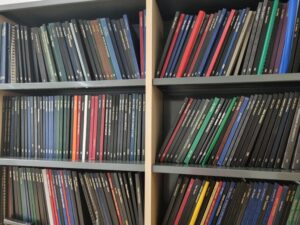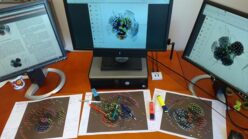Writing a Master’s thesis varies a lot from country to country, university to university, faculty to faculty, discipline to discipline, and supervisor to supervisor.

I am fortunate to have experienced the Portuguese, the French, the Dutch and the Finnish way of writing a Master’s thesis as a Erasmus Mundus student. I still remember that a Master’s thesis at a business school can be very different from place to place. Some are more oriented towards practice and act almost like an internship or action report, others are more oriented towards making a theoretical contribution to the existing scientific literature. Writing a thesis at a Finnish business school is more of the latter – therefore much of the student efforts are concentrated on reviewing the literature, and somehow extend it by scientific manners. The use of in-line citations, and a comprehensive reference list are expected – all in a congruent citation style.
At the Faculty of Social Sciences, Business and Economics, and Law (FSEJ) of Åbo Akademi, it is well documented in the evaluation criteria that you are expected to:
- Formulate a topic and motivate it in relation to the existing literature;
- Formulate the aim and research question(s);
- Identify, evaluate and review relevant literature;
- Chose a research method and argue for its choice;
- Independently apply the chosen method to create new knowledge;
Note that while on 1, 2, 3 and 4 the literature is your main point of departure, in 5 you are supposed to contribute back to literature. Corroborating, extending or criticizing extant theory are all good and welcomed contributions to a Master thesis.
For the ones starting the Master’s thesis process, the task seems daunting – after all many master theses take years to be completed (note this is exceptional, not the most common way). After supervising some master’s thesis at Turku University and Åbo Akademi, I would like to point out some misconceptions that will ease the life of the ones starting the Master’s thesis process at a Finnish Business school. Please note these are my own views and my own takes. They approximate the views of my colleagues supervising Master’s thesis at the Information Studies unit @ Åbo Akademi where I work – so take everything with a grain of salt and clarify pending issues with your own supervisor.
First misconception – You need to collected your own data
The first false assumption that students often take is that they need to provoke research data. To my view this is false. While collecting your own data from scratch is a merit, finding and combining research data collected by others can be a merit as well.
For example, Statistics Finland produces official statistics on Finnish society as well as Eurostat does the same at the European Union level that are often used in Master’s theses from public administration to national economics. If you are more into qualitative research, you can turn to the Finnish Social Science Data Archive which provides access to a wide range of digital research data or search for equivalent organizations in other EU countries.
It’s rare, but it is possible to buy data-sets, or pay somebody to collect data on your behalf or simply source it in a crowdsourcing platform. I discorate all these ways of getting data, as a master thesis should be a very individual project where both theory and your own “brain” should shape the data collection and analysis.
You do not always need to provoke your own data (e.g., experiments, surveys or interviews). There is so much naturally occurring digital trace data by publicly available data on the Internet these days. For example, you can study collaboration in open-source communities, study information contagions on Twitter, study the bidding mechanisms for ads on YouTube, study the evolution of co-citation networks in a given discipline, among many other things by simply leveraging data that already exists on the Internet.
In addition, please do not disregard the use of archives. For example, the Åbo Akademi University Library has an outstanding archive of documentation that goes back centuries. You can do a thesis on Finance by analyzing newspaper ads by banks in old newspapers, you can do a thesis on public administration by analyzing the evolution of old policy guidelines, or you can do research in information studies by reporting on how the library itself organizes its historical and cultural heritage.
Finally, I must remark that it is easier to collect and analyse your data than to grab large unstructured or undocumented data sets from the Internet. As you collect your data, you are at the same learning from it and getting familiar with it. Furthermore, data collection is often a creative process. You can do it in a “social” oriented way by conducting interviews or designing an online form to collect data from a targeted social group. You can also be more technical-oriented by screen-scrapping Internet pages, getting data via APIs (e.g., SOAP, REST, and GraphQL among other ways), or combining several data sets into a single curated one. Both social and technical-oriented skills can be valued by future employers.
Continue reading Six Misconceptions About Writing a Master’s thesis
